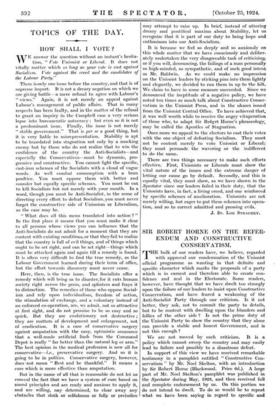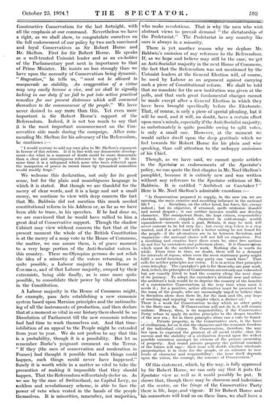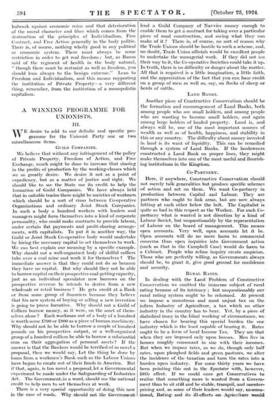SIR ROBERT HORNE ON THE REFERS ENDU1VI AND CONSTRUCTIVE CONSERVATISM.
THE bulk of our readers have, we believe, regarded with approval our condemnation of the Unionist official programme as wanting in that definite and specific character which marks the proposals of a party which is in earnest and therefore able to create con- fidence and zeal in the Electorate. Some readers, however, have thought that we have dwelt too strongly upon the failure of our leaders to insist upon Constructive Conservatism, and have feared a weakening of the Anti-Socialist Party through our criticism. Is it not better, they ask, not to commit the party to details, but to be content with dwelling upon the blunders and follies of the other side ? Is not the prime duty of the Unionist Party to show the country that they alone can provide a stable and honest Government, and is not this enough ?
We are not moved by such criticism. It is a policy which cannot sweep the country and may easily lead to failure and possibly to a disastrous defeat.
In support of this view we have received remarkable testimony in a pamphlet entitled "Constructive Con- servatism" by Mr. Noel Skelton, with an introduction by Sir Robert Home (Blackwood. Price 6d.). A large part of Mr. Noel Skelton's pamphlet was published in the Spectator during May, 1923, and then received full and complete endorsement by us. On this portion we do not intend to dwell. To do so would be to repeat what we have been saying in regard to specific and Constructive Conservatism for the last fortnight, with all the emphasis at our command. Nevertheless we have a right, as we shall show, to congratulate ourselves on the full endorsement of our policy by two such convinced and loyal Conservatives as Sir. Robert Home and Mr. Skelton. First for Sir Robert Horne. He speaks as a well-trusted Unionist leader and as an ex-holder of the Parliamentary, post next in importance to that of Prime Minister. He insists no less strongly than we have upon the necessity of Conservatism being dynamic. "Stagnation," he tells us, " must not be allowed to Ina.squerad,e as stability. An exaggeration of a virtue may very easily beconze a vice, and we shall be signally lacking in our duty if we fail to put into action practical remedies for our present distresses which will commend themselves to the commonsense of the people." We have never desired to say more than this. Yet even more important is Sir Robert Home's support of the Referendum. Indeed, it is not too much to say that it is the most important announcement on the Con- servative side made during the campaign. After com- mending Mr. Skeltoñ for his advocacy of the Referendum, he continues :— "I would venture to add my own plea to Mr. Skelton's argument in favour of this reform. It is in line with our democratic develop- ment—for what in a moment of doubt could be more democratic than a clear and unambiguous reference to the people ? At the same time it is a safeguard which none who have reflected upon the usurpation of power in recent times by tyrannical minorities would readily forgo."
We welcome this declaration, not only for its good sense, but for the plain and unambiguous language in which it is stated. But though we are thankful for the mercy of clear words, and it is a large and not a small mercy, we continue to view with deep concern the fact that Mr. Baldwin did not mention this much needed constitutional reform in his Address or, as far as we have been able to trace, in his speeches. If he had done so, we are convinced that he would have rallied to him a great deal of Conservative support. Though the shadow Cabinet may view without concern the fact that at the present moment the whole of the British Constitution is at the mercy of a snap vote in the House of Commons, the matter, we can assure them, is of grave moment to a very large portion of the Anti-Socialist voters in this country: These un-Olympian persons do not relish the idea of a minority of the voters returning, as is quite possible, a Labour majority in the House of Commons, and of that Labour majority, swayed by their extremists, being able finally, as is once more quite possible, to consolidate their power by vital alterations in the Constitution.
A Labour majority in the House of Commons might, for example, pass Acts establishing a new economic system based upon Marxian principles and the nationaliz- ing of all the instruments of production, and then declare that at a moment so vital in our history there should be no Dissolution of Parliament till the new economic reforms had had time to work themselves out. And that time- inhibition of an appeal to the People might be extended from year to year. We do not profess to say that this is a probability, though it is a possibility. But let us remember Burke's poignant comment on the Terror. " If they (the men of conservation and moderation in France) had thought it possible that such things could happen, such things could never have happened." Surely it is worth while in a matter so vital to take the precaution of making it impossible that they should happen. That the Referendum will certainly do for us. As we see by the case of Switzerland, no Capital Levy, no reckless and revolutionary scheme, is able to face the power of veto when vested in the hands of the people themselves. It is minorities, remember, not majorities. who make revolutions. That is why the in6n who wish abstract- views to prevail demand "the' dictatorship of the Proletariat." The Proletariat in any country like ours is always in a minority.
There is yet another reason why we deplore Mr. Baldwin's -omission of any reference to the Referendum. If; as we hope and believe may still be the case; w&tet an Anti-Socialist majority in the next House of Commons, the fact that the Referendum was net mentioned by. the Unionist leaders at the General Election will, of course, be used by Labour as an argument against carrying such a piece of Constitutional reform. We shall be told that no mandate for the new institution was given at the polls, and that such great fundamental changes cannot be made except after a General Election in which they have been brought specifically before the Electorate. That, of course, is only a piece of special pleading, but it will be used, and it will, no doubt, have a certain effect upon men's minds, especially if the Anti-Socialist majority, as unfortunately is quite possible owing to split votes, is only a small one. However, at the moment we would rather dwell upon the deep gratitude which we feel towards Sir Robert Horne for his plain and wise speaking, than call attention to the unhappy omissions of his Chief.
Though, as we have said, we cannot quote articles in the Spectator" as endorsements of the Spectator's policy, we can quote the first chapter in Mr. Noel Skelton's pamphlet, because it is entirely new and was written without any reference to the Spectator criticism of Mr. Baldwin. It is entitled "Architect or Caretaker ? " Here is Mr. Noel Skelton's admirable exordium :- "Ii Conservatism prepared to supply, in the new "era we are entering, the main creative and moulding influence in the national life ? . . . Socialism, on the other hand, has force, fire, energy indeed ; but its objective, if attained, spells economic disaster and moral despair ; it can neither increase wealth nor develop character. The omnipotent State, the kept citizen, responsibility checked, initiative crippled, character in cold-storage, wealth squandered—towards such a goal, Britain, it may be said, will never consent to be led very far ; but every step taken is a step Wasted, and if a safer road with a better ending be not found for the people—if the alternatives are to be between Socialism and stagnation—the national choice will not fall on stagnation. For a moulding and creative force there must be, since free nations do not live by caretakers and policemen alone. It is Conservatism which must do the architect's work. Nothing else is worth As while. From time to time, no doubt, there will be a demand for intervals of repose, when even the most stationary party might fulfil a useful function. But any party can 'mark tune., That calls for neither principles nor. vision. It is in action that principles come into play. The caretaker's job is for those who are past work, And, in fact, the principles of Conservatism are not only not exhausted but are exactly fitted to lead the country along the next stage of its journey. To adopt the caretaker's attitude now and refuse the architect's task would be to deprive the country of the benefits of a constructive Conservatism at the very time when most it needs it ; for a positive, active alternative must be presented to the mass of the people, who are unceasingly urged to believe that in Socialism alone does there lie, for the rank and file, any hope of reaching and enjoying 'an ampler ether, a diviner air.' . . . There is a work for Conservatism to-day which no other party in the State can do. If Conservatism will not do it, it will remain undone. Heavy, then, is its responsibility, if the Conservative Party refuse to apply its active principles to the deeper troubles of the new era ; for in these principles alone can a cure be found. . . . Private property, in the Conservative view, is the basis of civilization, for on it rest the character and the economic freedom of the individual citizen. To Conservatism, therefore, the way lies open to expound the greatest of all social truths—that the success and the stability of a civilization depend upon the widest possible extension amongst its citizens of the private ownership of property. And round private property the political combats of the future will rage : their issue will decide whether wholesale imaperization is in store for the people, or an advance to "new levels of character and responsibility : the issue itself depends upon the vision, the courage, the resource of Conservatism: Of this statement, which, by the way, is fully approved by Sir Robert Home, we can only say that it puts the Spectator view as well as it could possibly be put. It shows that, though there may be slowness and indecision at the centre, on the fringe of the Conservative Party there is life, hope, and vigour: If Sir Robert Home and his supporters will lead us on these lines, we shall have a bulwark against economic ruins and that deterioration of the moral character and fibre which comes from the destruction of the principles of Individualism, Free Contract, and Free Action generally in the body politic. There is, of course, nothing wholly good in any political or economic system. There must always be some restriction in order to get real freedom ; but, as Bacon said of the regiment of health in the body natural, "though there must be restraint as well as freedom, you should lean always to the benign extreme." Lean to Freedom and Individualism, and this means supporting the institution of Private Property—a very different thing, remember, from the institution of a monopolistic capitalism.




























































 Previous page
Previous page